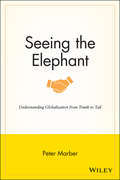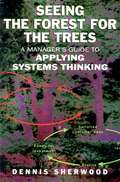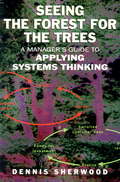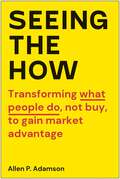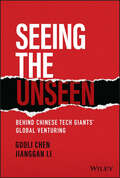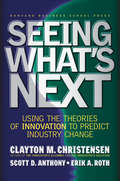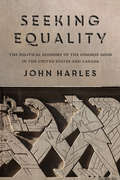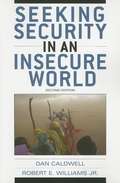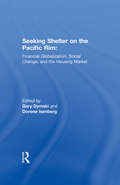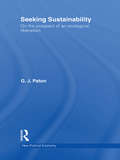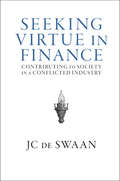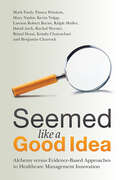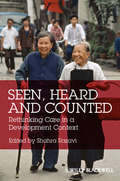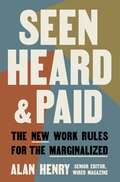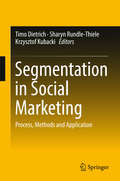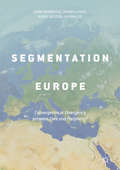- Table View
- List View
Seeing the Elephant
by Peter MarberThanks to globalization, more countries depend on each other for trade, capital, and ideas than ever before. Yet politically, these countries are drifting further apart. In Seeing the Elephant, author and emerging markets expert Peter Marber describes how increasing economic integration and the rise of new actors is drastically altering the geopolitical landscape, and offers insights on how the US can maintain a leading role in the 21st century and beyond.While America remains the single most important economy today, rising economic powerhouses -- China, Russia, India, Brazil and others -- bring a diverse set of interests to the table that the US cannot afford to ignore, Marber explains. Moreover, globalization has created thousands of non-state actors - corporations, banks, hedge funds, activists and even terrorists - who bring their own concerns to bear on the world system.In the era of globalization, America's success hinges on the success of its neighbors, too. Yet from its invasion of Iraq to its disregard of major treaties -- some recent US choices have shown little regard for these new players. As the lines between economic, defense, environmental, immigration, and energy policy become increasingly blurred, having a holistic and coherent approach to cross-border challenges is essential. Yet the forums and institutions that once coordinated these relationships - the UN, World Bank and the G7-- are losing relevance and no longer adequately represent the world's expanded power roster. To remain vital, Marber believes all our multilateral institutions will require fresh ideas and revamping.Seeing the Elephant demystifies globalization, and analyzes the megatrends and interconnections of the 21st century. With bold suggestions on how America reassert its historic leadership in the new global arena, Seeing the Elephant should be required reading for policy makers, businessmen and informed citizens alike.
Seeing the Forest for the Trees: A Manager's Guide to Applying Systems Thinking
by Dennis SherwoodSystems thinking can help you tame the complexity of real-world problems by providing a structured way of balancing a broad, overall view with the selection of the right level of detail, truly allowing you to "see the forest for the trees". Only by taking a broad view can we avoid the twin dangers of a silo mentality-in which a fix 'here' simply shifts the problem to 'there'-and organisational myopia-in which a fix 'now' gives rise to a much bigger problem to fix 'then'. Seeing the Forest for the Trees will give you all the tools and techniques you need, with many practical examples as diverse as managing a busy back office, negotiating an outsourcing deal and formulating business strategy.
Seeing the Forest for the Trees: A Manager's Guide to Applying Systems Thinking
by Dennis SherwoodSystems thinking can help you tame the complexity of real-world problems by providing a structured way of balancing a broad, overall view with the selection of the right level of detail, truly allowing you to "see the forest for the trees". Only by taking a broad view can we avoid the twin dangers of a silo mentality-in which a fix 'here' simply shifts the problem to 'there', and organisational myopia-in which a fix 'now' gives rise to a much bigger problem to fix 'then'. Seeing the Forest for the Trees will give you all the tools and techniques you need, with many practical examples as diverse as managing a busy back office, negotiating an outsourcing deal and formulating business strategy.
Seeing the Forest for the Trees
by Dennis SherwoodReaders learn to tame the complexity of real-world problems by using a structured approach of balancing broad views and relevant details. Managers will gain tips and advice on everything from dealing with a busy office to negotiating an outsourcing deal.
Seeing the How: Transforming What People Do, Not Buy, To Gain Market Advantage
by Allen P. AdamsonAmong today&’s most successful businesses are those that have significantly transformed our daily routines. This focus on the consumer experience, not solely on product, has enabled them to drive remarkable growth and customer loyalty and, in many cases, to create totally new marketplace categories. Seeing the How invites you to reimagine your brand, company, or idea through the lens of consumer experience. It gives today&’s disruptors a path to offering consumers a new and better way to do what they do, clearly demonstrating how to see opportunities, and how to seize them to great advantage. Two years ago, Zoom was unknown to most, six years ago, Netflix was a DVD delivery service. We ride in Ubers and stay with our families in Airbnb homes. We share Spotify playlists, refresh our closets with Bonobos, and pamper our pets with Chewy. We set up meetings with Calendly and pay bills with Venmo. The speed with which these disruptions to how we do things, and the enormous profits that come with changing daily routines, is breakneck and only point the way for other industries to carve out market dominance. Seeing the How brings together data-driven research on consumer behavior, behavioral psychology, marketing analysis, and storytelling to provide a framework to help identify the methods by which business leaders can make these experience disruptions possible. Allen P. Adamson, an expert in branding, experience creation, and innovation strategy offers businesses a step-by-step guide to breaking into the market based on the tactics of the biggest experience disruptors out there, including Netflix, Apple, Warby Parker, and Stitch Fix. These businesses speak to market segments and consumers that are diverse and far-flung. What they share is the extent to which they are experience disruptors. Their successes derive from their ability to make the stuff of daily life different, better, and easier. Successful experience disruption is the de facto new competitive advantage across all categories. With Seeing the How you&’ll have the strategy necessary to bring your disruption to life, command market segments, and cultivate consumer loyalty.
Seeing the Unseen: Behind Chinese Tech Giants' Global Venturing
by Guoli Chen Jianggan LiMeet the overnight tech success stories of China&’s globalizing business landscape In the last few years, we have seen a meteoric rise of Chinese tech companies across the world. Alibaba stock price movements unnerved investors globally, venture capitalists searched for the next Meituan or Pinduoduo in Southeast Asia and Latin America, and of course, Tik Tok, the most popular content platform in the world today, originated from China. The founders of such companies are typically credited with the &“tenacity to rough it out,&” the &“courage to venture into the unknown,&” and the &“vision to take their companies to new heights.&” However, the same can be said about Silicon Valley founders, or any successful entrepreneur. So, what gives Chinese founders and their companies the advantage in becoming multi-billion global enterprises? How does their leadership set strategies? How do they motivate their people? How do they move so fast and defend their turf in China&’s hyper-competitive tech market? When they expand overseas, how do they determine what they keep and what they need to let go of? And most importantly, what do these things mean to you as a competitor, investor, regulator, or even as an executive or customer of such companies? Seeing the Unseen: Behind Chinese Tech Giants&’ Global Venturing answers these questions and delves into the fascinating world of Chinese logic that shapes how tech leaders make and implement decisions, many of which are seldom seen outside China. In this book, you will gain an accurate, concise understanding of Chinese tech companies' reflections as they scale. You will understand the different generations of Chinese tech giants from Alibaba, Tencent, Baidu and Huawei to Pinduoduo, Meituan, ByteDance, Xiaomi and more. In this Seeing the Unseen, the analysis behind the success and lessons learned is summarized into a unique framework that touches on People, Organization, and Product and Leadership (POP-Leadership). The book covers: How Chinese history, folklore and Mao Zadong&’s political strategies have shaped the strategies of Chinese tech leaders, even today The mindsets of Chinese tech and internet companies and how they have evolved over the last two decades The unique business culture and leadership styles that steered these companies through uncertain and ultra-competitive periods How Chinese companies structure their organizations and products and how they remain agile as they scale The limitations of Chinese POP-Leadership, and what these companies must shed to keep up with international players in global markets How Chinese POP-Leadership is now becoming international, and how international players are leveraging these learnings How the worldwide expansion of Chinese companies will alter the business landscape in the coming decades Chinese firms undertaking overseas ventures can challenge our thinking on global strategy and implementation. This book gives you a better understanding of these emergent players in the global arena.
Seeing What's Next: Introduction (How to Use Theories of Disruptive Innovation to Predict Industry Change)
by Scott D. Anthony Erik A. Roth Clayton M. ChristensenThis chapter sets forth the goal of the book--to demonstrate how to use theories of disruptive innovation to conduct an "outside-in" analysis of how innovation will change an industry. The chapter outlines the core theories of innovation and introduces two case examples--the birth of the telephone and the explosion of wireless technologies--to exemplify the theories.
Seeing What's Next
by Clayton M. Christensen Scott D. Anthony Erik A. RothEvery day, individuals take action based on how they believe innovation will change industries. Yet these beliefs are largely based on guesswork and incomplete data and lead to costly errors in judgment. Now, internationally renowned innovation expert Clayton M. Christensen and his research partners Scott D. Anthony and Erik A. Roth present a groundbreaking framework for predicting outcomes in the evolution of any industry. Based on proven theories outlined in Christensen's landmark books The Innovator's Dilemma and The Innovator's Solution, Seeing What's Next offers a practical, three-part model that helps decision-makers spot the signals of industry change, determine the outcome of competitive battles, and assess whether a firm's actions will ensure or threaten future success. Through in-depth case studies of industries from aviation to health care, the authors illustrate the predictive power of innovation theory in action.
Seek the Truth: How Emotions and Biases Can Distort Progress Evaluations of Innovation Initiatives-and How to Counteract Them
by Vijay Govindarajan Chris TrimbleInnovation is a risky business, fraught with the possibility of failure. In what the authors call the Moment of Truth, you evaluate the success-or failure-of your initiative. A simple innovation might have only one Moment of Truth, but for most initiatives, there are many. And each one is more than just a learning opportunity; it is a critical chance to alter the trajectory of the initiative and improve its odds of success. In this chapter, the authors show how emotions and biases can undermine conversations about how an innovation is progressing, even with a crystal-clear hypothesis, a rigorous learning process, and a solid framework for accountability all in place. They describe seven biases that can impede learning and cloud judgment during Moments of Truth, with overcommitment to the original innovation plan being by far the most common and most dangerous. Using examples from Deere & Company, Thomson Corporation, and Fisher-Price, they offer practical ways to evaluate progress and keep your innovation initiative on the path to success. This chapter was originally published as Chapter 6 of "The Other Side of Innovation: Solving the Execution Challenge."
Seeking Alpha in the Afterlife: CMG Life Services and the Life Settlement Industry
by Lauren H. CohenThe work of CMG Life Services provides a window into the life settlement industry, showing the difficulties that one young company faces in trying to solve a market failure. This case uses CMG's strategic dilemma to both illuminate the mechanics of a small, inefficient market and show how the success or failure of a market can sometimes depend on more than intrinsic value. The case lays out disagreement about the future of the industry, and even within the industry as key players differ on the most promising path forward. Ultimately, the promise of the life-settlement market for both insurance policy holders and investors may not be realized, and the case lays out the strategic impasse and key factors that will dictate its resolution.
Seeking Equality: The Political Economy Of The Common Good In The United States And Canada
by John HarlesSeeking Equality compares economic inequality in the United States and Canada. The North American neighbors have much in common—socially, politically, and economically—yet Canadians enjoy significantly higher levels of equality and material well-being. Harles explores the values and policy decisions that have influenced these different economic outcomes. Drawing on the Canadian experience, he explains why a yawning gap between the very rich and the rest should be cause for civic anxiety in the United States...and what can be done about it.
Seeking Peace in El Salvador
by Diana Villiers NegroponteThe resolution of the civil war in El Salvador coincided with the end of the Cold War. After two years of negotiations and a decade-long effort to implement the peace accords, this work questions how peace was made and whether it has endured.
Seeking Security In An Insecure World
by Dan Caldwell Robert E. WilliamsThis comprehensive yet concise introduction to international security explores the constantly changing conditions that lead to an insecure world. During the Cold War, the Soviet-American nuclear rivalry generated insecurity. Since then, state-based nuclear threats have diminished while the threat of non-state actors wielding weapons of mass destruction has increased. A global surge in mass-casualty terrorism, persistent and costly intrastate wars, and environmental threats have reshaped our thinking about security threats and how best to respond to them.
Seeking Shelter on the Pacific Rim: Financial Globalization, Social Change, and the Housing Market
by Gary Dymski Dorene IsenbergThis innovative book analyzes the changes that financial globalization is bringing about in the housing and home-finance markets of the United States, Japan, and South Korea, with special attention to the circumstances of women in obtaining housing, credit, and personal security. The book's focus on changes in the residential and housing finance markets serves as a window for an integrated examination of how the liberalization of national financial markets has affected the relationship among all players in each of the three economies - government, markets, and individual citizens. Through this examination Housing Finance Futures develops a new critical response to economic globalization based on a groundbreaking concept, the social efficiency of policy and market shifts.
Seeking Sustainability: On the prospect of an ecological liberalism (New Political Economy Ser. #17)
by G. J PatonThe ideas of neoliberalism perpetuate a disembedded and dichotomised view of economy-ecology relations. The renewed interest in climate change and sustainability attests to the lack of progress achieved by the ‘sustainable development’ regime and to the need for more appropriate frameworks for guiding social organisation toward ecological sustainability. This book is born of the need for a critique of current approaches to environmental policy and governance and the search for alternative sustainability frameworks. Utilising a conceptual approach based on the Polanyian concept of ‘embeddedness’, this book argues that the links between economic theory, neo-liberalism, and the current regime of sustainable development, have rendered ‘sustainability’ a discursive frame in the service of economic rather than ecological goals. In rejecting the integrity of ‘environmental neo-liberalism’, Paton argues there are some clear points of divergence between liberalism and neo-liberalism. She subsequently examines separately the impact on liberalism of efforts to integrate environmental concerns in order to determine if therein lies the potential for an effective reformist politics of ‘ecological sustainability’.
Seeking Talent for Creative Cities
by Jill GrantWith the growth of knowledge-based economies, cities across the globe must compete to attract and retain the most talented workers. Seeking Talent for Creative Cities offers a comprehensive and insightful analysis of the diverse, dynamic factors that affect cities' ability to achieve this goal.Based on a comparative national study of 16 Canadian cities, this volume systematically evaluates the concerns facing workers operating in a range of creative endeavours. It draws on interviews, surveys, and census data collected over a six-year research program conducted by experts in business, public policy, urban studies, and communications studies to identify the characteristics and features of particular city-regions that influence these workers' mobility and satisfaction. Seeking Talent for Creative Cities represents a rigorously empirical test of popular wisdom on the true relationship between urban development and economic competitiveness.
Seeking Transformation Through Information Technology
by Nagy K. Hanna Peter T. KnightThe ability to harness Information Communication Technologies (ICTs) is increasingly at the heart of national competitiveness and sustainable development. As countries seek a way out of the present period of economic contraction, they are trying to weave ICT into their development strategies, in the same way enterprises have learned to use ICT to transform their business models and strategies. This integration offers a new path to development that is responsive to the challenges of our times. In Seeking Transformation Through Information Technology, Nagy Hanna and Peter Knight provide a framework for assessing the opportunities, challenges, and prospects for "e-transformation." Featuring contributions from country experts, the editors and authors provide in-depth case studies of ICT deployment in Brazil, China, Canada, and Sri Lanka, and asses the progress of such efforts. The result is an essential resource for academic researchers, policy analysts, policymakers, and industry leaders interested in the role of ICT in national development, innovation, and economic growth.
Seeking Virtue in Finance: Contributing to Society in a Conflicted Industry
by JC de SwaanSince the Global Financial Crisis, a surge of interest in the use of finance as a tool to address social and economic problems suggests the potential for a generational shift in how the finance industry operates and is perceived. J.C. de Swaan seeks to channel the forces of well-intentioned finance professionals to improve finance from within and help restore its focus on serving society. Drawing from inspiring individuals in the field, de Swaan proposes a framework for pursuing a viable career in finance while benefiting society and upholding humanistic values. In doing so, he challenges traditional concepts of success in the industry. This will also engage readers outside of finance who are concerned about the industry's impact on society.
Seemed Like a Good Idea: Alchemy versus Evidence-Based Approaches to Healthcare Management Innovation
by Mark Pauly Flaura Winston Mary Naylor Kevin Volpp Lawton Robert Burns Ralph Muller David Asch Rachel Werner Bimal Desai Krisda Chaiyachati Benjamin ChartockConsumers, public officials, and even managers of health care and insurance are unhappy about care quality, access, and costs. This book shows that is because efforts to do something about these problems often rely on hope or conjecture, not rigorous evidence of effectiveness. In this book, experts in the field separate the speculative from the proven with regard to how care is rendered, how patients can be in control, how providers should be paid, and how disparities can be reduced – and they also identify the issues for which evidence is currently missing. It provides an antidote to frustration and a clear-eyed guide for forward progress, helping health care and insurance innovators make better decisions on deciding whether to go ahead now based on current evidence, to seek and wait for additional evidence, or to move on to different ideas. It will be useful to practitioners in hospital systems, medical groups, and insurance organizations and can also be used in executive and MBA teaching.
Seen, Heard and Counted: Rethinking Care in a Development Context (Development and Change Special Issues #6)
by Shahra RazaviContributors analyze the care economy in the developing world, at a moment when existing systems are under strain and new ideas are coming into focus. Offers the first global, regionally diverse study of the “invisible economy” of care, including case studies from diverse regional contexts of Africa, Asia and Latin America Frames the debate on care and highlights policy experimentation and ideas currently in flux Includes new research and data on developing countries, showing how, where care options for the socially disadvantaged are limited, failing to socialize the costs of care exacerbates existing inequalities Comes at a moment when, if not yet marked by a generalized care crisis, the world’s existing systems are under strain and in need of rethinking Features introductory chapters that set out the conceptual framework and findings on individual country studies, and a concluding chapter that draws out the transnational dimensions of care
Seen, Heard, and Paid: The New Work Rules for the Marginalized
by Alan HenryThe real tools for career success and work satisfaction for anyone feeling undermined or marginalized at their job, from a productivity expert and editor at Wired.&“Alan Henry doesn&’t just illuminate the invisible barriers that often stand in the way of success—he shines a light on what you can do to break through them.&”—Adam Grant, #1 New York Times bestselling author of Think Again and host of the TED podcast WorkLife For over twenty years, Alan Henry has written about using technology and productivity techniques to work and live better for publications such as Lifehacker, The New York Times, and Wired. But he found that as a Black man he didn&’t have access to some of the more powerful ways to hack your job—like only checking email once a day or blocking out time on your calendar to do deep work. In fact, he found that even when he landed a prestigious title at the Times, there were moments when he was still overlooked and excluded from the most interesting and career-boosting work. This led him to first explore these struggles in a Times piece titled &“Productivity Without Privilege.&” Now he goes even deeper, interviewing experts across multiple fields to come up with powerful tools to overcome the forces of marginalization. In Seen, Heard, and Paid, Henry shares the new work rules that may finally allow people of color, women, and LGBTQ+ folks to have the same access to career advancement and rewarding work as those with more privilege, including: How to Be Seen: Only spend time on work that gets you attention.How to Be Heard: Figure out your unique contribution. How to Get Paid: Data is power and power is money. Whether you&’re dealing with microaggressions, trying to get the glamour work instead of the office housework, weighing the pluses and minuses of working remotely, or deciding it&’s time to look for a new opportunity, Seen, Heard, and Paid will help you feel informed, supported, and empowered.
Segment Your Workforce: One Path to Executing the "Workforce of One" Approach to People Management
by David Y. Smith Susan CantrellWhen it comes to crafting HR practices that are highly relevant and tailored to individuals, organizations can choose one of four different approaches to what talent management experts Susan Cantrell and David Smith call the "workforce of one." But no matter which approach you choose, the goal is the same: work that is sculpted to fit lives instead of lives that are sculpted to fit work. The reward? Lower employee turnover, greater productivity, and improved profit margins. In this chapter, the authors explore the segmentation approach to customizing your HR practices-an approach that breaks down the monolithic concept of a workforce into more granular, meaningful parts and allows you to craft distinctive practices to manage each segment. You can segment your workforce in different ways: by life stage or generation, geography, role or type of work, and value. Some companies are even segmenting according to employees' learning styles, health and well-being, or behaviors and personal values. The chapter explains each one and concludes with practical recommendations for customizing your people management practices through segmentation. This chapter was originally published as Chapter 2 of "Workforce of One: Revolutionizing Talent Management Through Customization."
Segmentale verschijnselen: Een bijdrage aan diagnostiek en therapie
by Ben CranenburghSegmentale verschijnselen behandelt de theoretische achtergronden en de praktische toepassingen van segmentale relaties in diagnostiek en therapie. Vooral de diagnostische betekenis wordt verder uitgewerkt.De wisselwerking tussen organen en lichaamsdelen heeft zijn oorsprong in een proces van segmentatie dat vroeg in de embryonale ontwikkeling optreedt. Deze wisselwerking binnen het segment heeft voor de huisarts vooral een diagnostisch belang. Door gericht te letten op deze verschijnselen kan de huisarts met eenvoudige middelen in een vroeg stadium op het spoor komen van orgaanafwijking. Voor fysiotherapeuten is natuurlijk de therapeutische toepassing van belang; de beïnvloeding van orgaanfuncties via prikkeling van meer oppervlakkige lichaamsstructuren.
Segmentation in Social Marketing
by Timo Dietrich Sharyn Rundle-Thiele Krzysztof KubackiThis book brings together current innovative methods and approaches to segmentation and outlines why segmentation is needed to support more effective social marketing program design. It presents a variety of segmentation approaches alongside case studies of their application in various social marketing contexts. The book extends the use of segmentation in social marketing, which will ultimately lead to more effective and better-tailored programs that deliver change for the better. As such, it offers a detailed handbook on how to conduct state-of-the-art segmentation, and provides a valuable resource for academics, social marketers, educators, and advanced students alike.
The Segmentation of Europe: Convergence Or Divergence Between Core And Periphery?
by Mark Baimbridge Ioannis Litsios Karen Jackson Uih Ran LeeThis book explores economic developments across Europe in relation to its apparent segmentation, as disparities widen between core and periphery countries. In contrast to previous literature, the scope of analysis is extended to Europe as a continent rather than confining it solely to the European Union, thereby providing the reader with greater insight into the core/periphery nexus. The authors commence with a critical appraisal of economic thinking in relation to regional trade agreements and monetary integration. In relation to a number of EU economies, the book addresses issues of a liquidity trap, deflation, and twin deficits, together with the interconnection between exchange rates and current account balances. Importantly, they extend the discussion of segmentation through a series of focused case studies on Russia, Brexit and emergence of the mega-regionals.
